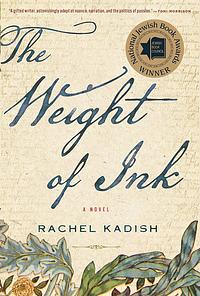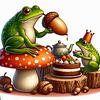Take a photo of a barcode or cover
This book, like me after the holiday season, could stand to lose a few. Many sections bear no function - they neither deepen our understanding of the characters nor move the story forward - and are mere redundancies. I wish we had gotten to know Aaron and Helen better, as despite the bloat of the book, my knowledge of them felt oddly superficial.
Historical fiction fans, this is a keeper. Best book I've read since Lilac Girls.
"The Weight of Ink" is an ambitious book, really more like three stories in one: There's a section that unfolds in 17th century Europe and another in London in 2001, with flashbacks to Israel just after the country's founding. I found the early chapters somewhat slow. Just as you settle into one story and get invested in a female scribe working in the 1660s, the author switches centuries and you have to remind yourself about the details of the other set of characters. As I reached the middle of the book, however, all of the details started to come together. By the end, I found the story downright suspenseful. This is not a novel you can read while you're distracted, and it's not a book for anyone who easily tires of exposition. But if you stick with the story, you'll be rewarded. Lots of interesting Jewish feminist history and philosophy here, too!
I adore Kadish's lilting prose. The fourth sentence knocked the breath out of me, "Hope against reason: an opiate she'd long abandoned." It just keeps getting better. It is high praise from me to invoke Muriel Barbery's Elegance of the Hedgehog. This is exquisite writing about a topic with which I am fascinated. Her characters are profoundly real. Her descriptions are visual magic. I agree with the many comparisons to Byatt's Possession.
I didn't know much about the 16th century Jewish population of England, so learned a lot from this book, as well as the process of processing and transcribing very old documents. I enjoyed the book, but was a little disappointed in the ending. Well written, and good character development for the major characters.
It took me a little while to get my get my head around the characters, the two time periods in which the novel takes place, and the historical references, but several chapters in, I was hooked and settled in for the ride. This is a lovely story about two women three centuries apart but united by a thirst for knowledge and the power of the written word. I wish I could see the house where the collection of papers was found in the novel. The description is magnificent. For all who loved People of the Book, I highly recommend.
Don’t let the girth of this one keep you away! An exciting tale of prejudice, scholarship, perseverance, and thwarted, sweeping love across the ages, faiths, and continents.
Two archivist/historians at opposite ends of their careers make an astounding find that sheds new light on post-expulsion Jewish life in Shakespeare-era England. Explorations of gender roles then and now, friendship across generations, and the questions of who is a hero and who gets to tell the history.
If you liked Brooks’ The People of the Book, you will probably like this one, too. Fascinating.
Two archivist/historians at opposite ends of their careers make an astounding find that sheds new light on post-expulsion Jewish life in Shakespeare-era England. Explorations of gender roles then and now, friendship across generations, and the questions of who is a hero and who gets to tell the history.
If you liked Brooks’ The People of the Book, you will probably like this one, too. Fascinating.
informative
inspiring
slow-paced
Plot or Character Driven:
Character
Strong character development:
Yes
Loveable characters:
Yes
Diverse cast of characters:
Yes
Flaws of characters a main focus:
Yes
Concise and sweeping, taking the reader into profound questions with a light touch, A Weight of Ink is now one of my favorite books of all time. As an additional and rare treat, many of the characters feel like people I might actually know. Not wanting to leave its worlds, I read this book twice. It was even better the second time, as I noticed more details and connections.
This book is a very clear case of “it’s not you, it’s me”, because by all accounts, I should have loved it. It’s a feminist, historical mystery, very well constructed around two narrative lines and beautifully written. And yet reading it felt like a slog, and it took me for ever to get through it. I am reviewing it more from a sense of duty than from any kind of enthusiasm. To be clear, this is a good book, but it was not for me and/or the timing of my picking it up was completely wrong.
Helen Watt is an academic at the twilight of her career. Her health has been declining, and while she stoically carries on, she knows it won’t be possible to keep up the pretense forever. How ironic that an amazing discovery should be made at that moment of her life: a historical home in Richmond is being renovated, and a quantity of Restoration-era documents are found in a recess under a staircase. Documents which soon reveal something momentous: they were written by someone who should not have been anywhere near the work of a scribe...
The other narrative line follows Ester, a young Jewish woman living under the protection of a rabbi in the late 1600s in London, after she and her brother were exiled from Amsterdam. Her family name carries a stigma, but Ester’s temper and intelligence mark her as even more of a outsider than her patrimony. She is interested in philosophy, and she knows the subject is forbidden to women. But when he brother leaves the shelter of their new home, she is called upon to act as scribe to the rabbi, opening a door she never thought she’d be able to walk through.
Now doesn’t that all sound super freaking awesome? I really feel like it should have been, but somehow, it left me completely cold and only mildly curious as to what would happen next. It’s not even that I hated the characters: I can deal with unlikable characters quite well, but the entire cast around which this story revolved simply bored me. I absolutely can’t explain it.
My point is, this is an objectively good book, and I must have been wearing my grumpy pants the whole time I read it, so disregard my opinion and check it out!
Helen Watt is an academic at the twilight of her career. Her health has been declining, and while she stoically carries on, she knows it won’t be possible to keep up the pretense forever. How ironic that an amazing discovery should be made at that moment of her life: a historical home in Richmond is being renovated, and a quantity of Restoration-era documents are found in a recess under a staircase. Documents which soon reveal something momentous: they were written by someone who should not have been anywhere near the work of a scribe...
The other narrative line follows Ester, a young Jewish woman living under the protection of a rabbi in the late 1600s in London, after she and her brother were exiled from Amsterdam. Her family name carries a stigma, but Ester’s temper and intelligence mark her as even more of a outsider than her patrimony. She is interested in philosophy, and she knows the subject is forbidden to women. But when he brother leaves the shelter of their new home, she is called upon to act as scribe to the rabbi, opening a door she never thought she’d be able to walk through.
Now doesn’t that all sound super freaking awesome? I really feel like it should have been, but somehow, it left me completely cold and only mildly curious as to what would happen next. It’s not even that I hated the characters: I can deal with unlikable characters quite well, but the entire cast around which this story revolved simply bored me. I absolutely can’t explain it.
My point is, this is an objectively good book, and I must have been wearing my grumpy pants the whole time I read it, so disregard my opinion and check it out!





